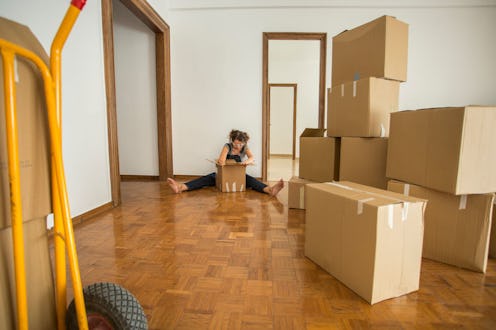Life
5 Simple Ways You Can Make Moving House Way More Eco-Friendly

Moving homes can be exciting at it’s best, and a stressful, logistical nightmare at its worst. There’s so much to think about, like what is the best technique to get everything boxed up? Is it the meticulous Marie Kondo style? Or simply shoving everything into unmarked boxes in a panic? And then, of course, figuring out how to transport all your possessions to your new home just adds another thing to the never ending to-do list. It’s easy to forget to make moving house more eco-friendly when there are a million other bits and bobs to get done, so I've put together a handy list that'll help make your moving experience a little bit greener.
Through all the chaos of moving, your normal sustainable routines might go out the window. Suddenly you’re drowning in single-use plastic bubble wrap, giving up on recycling, and chucking perfectly good food in the bin. Moving house can be challenging but it doesn’t have to be bad for the environment too. By being a bit inventive, and with the help of forward planning, there are loads of ways you can make the moving process slightly easier and eco-friendly all at the same time. From donating to charity to using alternative packaging, here is a list of tips and tricks to make moving home more eco-friendly:
1Don’t dump — donate
Downsizing before moving out is always a good idea, but you don't need to throw out perfectly good items. Sometimes you end up moving to a partially furnished house and need to get rid of some furniture. Instead of sending them to the skip, why not give them to a charity shop or donate them to a free swap scheme in your local area? The same goes for clothes; try and organise the downsizing far enough in advance so you don’t panic and chuck everything out.
2Use eco-friendly packaging
Nobody wants smashed china in transit, so normally wrapping everything in bubble wrap is the answer to keeping your stuff in one piece during the move. But with single-use plastic contributing for 40% of all plastic produced, the planet shouldn’t suffer for your big move. There’s now paper bubble wrap available, and, better yet, why not use old newspapers? And, if you're looking for boxes, go to your local shop and ask to use their old packaging. They're usually more than happy to pass on what they're not using.
3Avoid wasting food
It’s easy to see your semi-full cupboards and the temptation to chuck out all the food and start afresh in your new home kicks in. But 7.1 million tonnes of household food goes to waste in the UK alone, so maybe reconsider before getting rid. A few weeks before you move, have a look at everything in your cupboard and plan some meals around what you already have. See it as a chance to get inventive and try out some new recipes. Or, if you can, bring it with you. Lots of food can survive the move, so just take it along. You'll be very happy to have something in the cupboard once you're all moved in but can't be bothered to go down to Tesco.
4Think about your transport
You’re probably going to need a vehicle to transport your goods, and, unless you're moving two doors down, that can’t really be helped. But what can be helped is how you transport your things, and how many journeys you make. Downsizing and packing smartly could cut down the number of drives. Also, using an electric car or van is another way to be more sustainable.
5Use eco-friendly cleaning products
Getting your house in tip-top shape before leaving is a must, but instead of using all the usual cleaning products that aren’t the best for the environment, why not get some eco-friendly cleaning products to cut out on some of those pesky chemicals? Also, you can make your own cleaning cloths out of old clothes or fabric you have lying around.
This article was originally published on